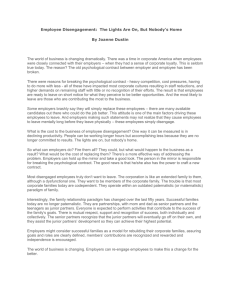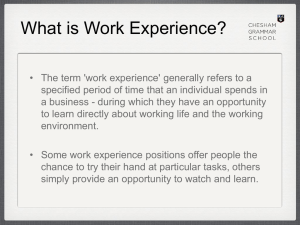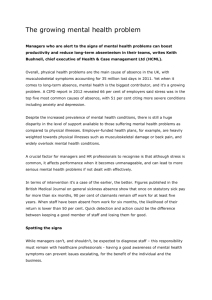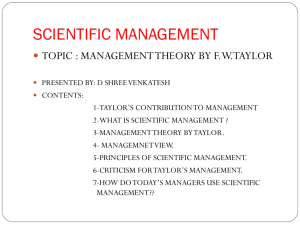Flex Day Presentation:Student Needs/Soft Skills
advertisement
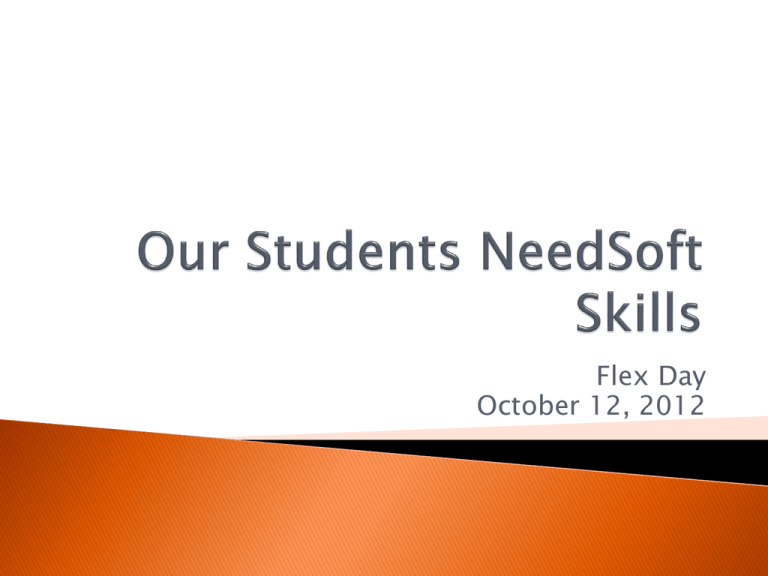
Flex Day October 12, 2012 Taylor Mali: What teachers make http://www.ted.com/talks/taylor_mali_what_t eachers_make.html 2 So, what’s Taylor Mali talking about? Outcomes and how he gets them Expectations—high ones for himself, for his students, and for their parents Why teachers (counselors, librarians, all educators) are important to student learning Can you be him? Use his methods? Get his outcomes? 3 Maybe? Maybe not? But you can have higher expectations for your students that will lead to better outcomes. “And how is that?” you ask, doubtful that what I am about to say is true or possible. A story about the past 6 months. 4 What did I learn from all of this? 1. Everyone out there has a connection to Delta College—it’s all positive. 2. Everyone out there loves (true!) Delta College. They think it’s theirs and they want to protect it! 3. Everyone out there wants the Delta College president at his/her event— others can come, but there’s no substitute for the President. 5 All of this is great—and I really knew it anyway, but what I really learned was this: In addition to learning a content area or a trade or occupation, what employers and others really expect us to teach our students and their potential employees (and even their transfer students) is the “soft skills.” And what in the heck are they? 6 Soft skills are positive personality traits such as common sense, responsibility, integrity, and a sense of humor. Soft skills are abilities such as teamwork, perseverance, leadership, communication, good manners, negotiation skills, empathy— people skills, “desirable behavior”—show up; show up on time; meet expectations; treat others with respect; stay off the cell phone at work; turn in your work on time, etc. 7 The teaching of soft skills is a multi-million dollar business. Companies and individuals pay to teach people how to work well with others and behave well in a work setting. Soft skills, or the lack of them, is what we all complain that our students don’t have! So we and the employers out there agree. 8 What does our mission statement say about the teaching of “soft skills”? Nothing, specifically. But what it does say is that it’s our mission “to provide excellent post-secondary education that serves the needs of students, and the District community through continuing, transfer, career and technical education, and economic development.” Well, if students need them, and the external community needs students who have them, shouldn’t we consider teaching them? 9 1. It’s not my job. I am a subject matter expert! 2. I tried in 1962; it didn’t work. 3. I’ll get student grievances; administration (evil empire) won’t back me up if I make demands on students. 4. Students shoulda learned it in high school, middle school, elementary school, kindergarten, nursery school, etc. 5. etc. 10 1. Most students don’t respond well to “arbitrary” rules and regulations. Simple demands for obedience don’t make sense to them. They want to know why, and “’cause I said so isn’t a very satisfying answer.” 2. It’s easier to have high expectations and hold students to them if the students understand the reasons for them. “I will penalize you for late work because your future employers will expect you to turn your work in on time.” 11 We can provide you with information and quotations from local employers that will support your rules as reasonable and necessary. “Our employees are not allowed to use their cell phones except on their breaks.” “Our employees work in teams; each employee must do his/her part to reach the team’s goals successfully; we can’t afford to keep employees who can’t work in teams.” We will be better able to support the consequences you mete out for offensive or inappropriate behavior if you’ve explained why you have certain rules, what the consequences are for breaking them, and why you are enforcing them. 12 You will do the students a great service because they will understand better how to behave in a work setting and they will be more successful. If all or most instructors would “contextualize” the behaviors they want to see in their course information sheets/syllabi, everyone can feel supported, and overall, students will be held to higher expectations and the outcome will be better prepared students and employees. 13


